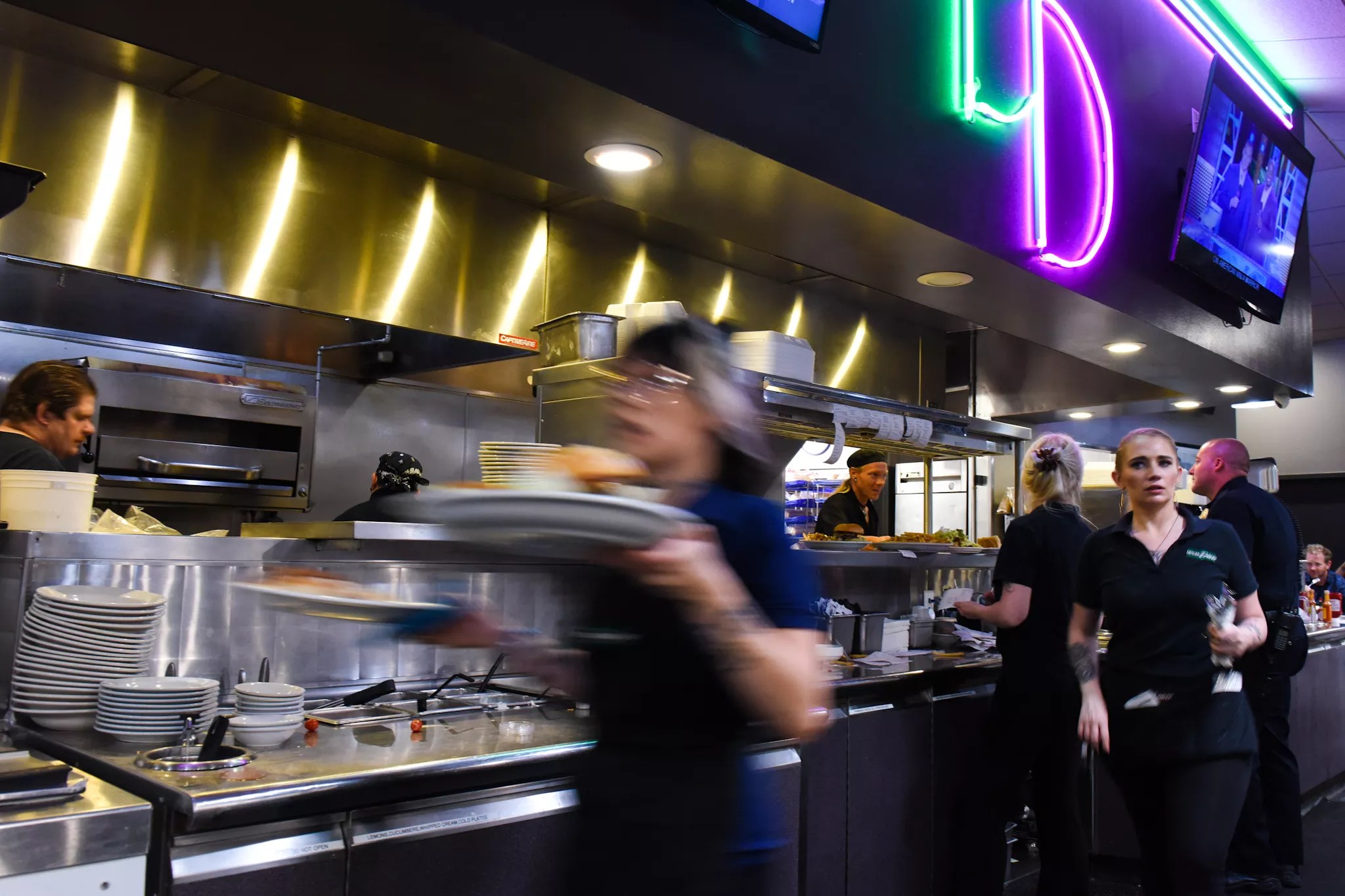
Kenzie Bruce

Audio By Carbonatix
In the last ten years, the minimum wage for tipped workers in Denver has more than tripled and the resulting increase in labor cost has played a major factor in the closure of many local restaurants. Now, state lawmakers are considering a bill that would roll back those increases.
If made law, House Bill 1208 would change regulations around tipped wages in municipalities with a higher minimum wage than the rest of the state, including Denver. This would effectively make the hourly minimum wage for tipped workers the same statewide, at least temporarily.
Denver’s hourly minimum wage is $15.79 for tipped employees like servers and bartenders. Under the proposed bill, it would decrease to $11.79, which is the current statewide minimum wage for tipped workers. However, if workers don’t earn enough tips to reach the city’s regular minimum wage of $18.81, employers would still need to pay the difference, as is current law.
Proponents say the $4 drop in base hourly wages could make or break Denver restaurants.
“Right now we’re just trying to stop the bleeding in the cities that are the most desperate,” says Sonia Riggs, president and CEO of the Colorado Restaurant Association (CRA). “It’s been death by a thousand cuts for restaurants. This is the final cut.”
Colorado has a fixed “tip credit” allowing the minimum wage for tipped workers to be $3.02 less than the standard minimum wage. That amount doesn’t change as minimum wages go up. Riggs says restaurant owners have been pushing to adjust the tip credit for years, particularly since 2019, when a bill passed to let local governments set minimum wages higher than the state’s. But legislators were unwilling to address the issue at the time, she claims.
“We’re seeing the devastation it has caused,” Riggs says. “It was a real oversight. People didn’t understand what it was going to do to the restaurant industry. Now we see how that has played out.”
The recent wave of closures can be attributed to many factors including COVID-19 and rising costs of food, rent and insurance. But advocates behind House Bill 1208 say reducing labor costs would be a huge help, as they make up an increasingly large share of expenses. A CRA survey of 135 restaurants found that 2025 minimum wage increases cost Denver restaurants an average of $82,412, compared to $52,591 statewide.
Opponents argue that reducing the base wages of workers who are largely low-income and grappling with the same cost of living increases as restaurant owners is not the way to go.
“This bill is nothing more than a massive wage cut for Colorado’s tipped workers,” says Saru Jayaraman, president of One Fair Wage. “It would roll back local efforts to raise wages, keeping workers trapped in poverty and forcing them to rely almost entirely on tips just to survive.”
Denver tipped workers would not make less than the city’s $18.81 minimum wage under the proposed bill. But by reducing their base hourly pay to $11.79, the vast majority of tipped employees would lose income. Basically, unless a tipped employee is making less than $7.02 in hourly tips under the current system, the change would result in them taking home less money.
In Denver, the hourly minimum wage of tipped employees would drop by $4. In other municipalities like Boulder and Edgewater, the reduction would range from 76 cents to $1.76.
“This is a direct attack on working people,” Jayaraman says. “It’s unacceptable to make the lowest-paid workers bear the burden of the restaurant industry’s challenges while corporate chains continue to make record profits. Tipped workers deserve a full minimum wage with tips on top – not a legislative pay cut.”
Restaurant owners argue that the change would help tipped workers in the long run by keeping more restaurants in business and preserving their jobs. In addition, some claim they would use the money saved to increase pay for non-tipped back-of-house employees like line cooks and dishwashers.
In some Denver restaurants, non-tipped employees earn half the pay of their tipped coworkers, despite having a higher hourly minimum wage. The CRA survey of 135 restaurants found that the average hourly earnings of tipped workers was $39 to $42 including tips, compared to $19 to $23 for non-tipped workers.
Karen LuKanic, owner of Chef Zorba’s, says she spends more than half of the restaurant’s earnings on payroll.
“I’ve had to eliminate almost all entry-level positions,” LuKanic says. “But even that plus cutting staff hours isn’t enough to keep our business above water. … A higher tip offset would help me stay open, hire more people, add hours back, and pay my kitchen team more, too.”

Karen LuKanic, owner of Chef Zorba’s.
Mark Antonation
How Does It Work?
In Colorado, tipped workers can be paid $3.02 less per hour than the regular minimum wage, assuming that the tips they receive will make up the difference in pay. If they’re not tipped enough, employers have to pay the difference so the workers still earn the minimum wage.
That’s been the case since 2006 when Colorado adopted its own minimum wage. Back then, the state minimum wage was $5.15. Today, it’s $14.81. That means that when the $3.02 tip credit was established, tips were expected to cover nearly 59 percent of an employee’s earnings. Now, tips are only expected to cover 20 percent, forcing employers to take on a larger share of employee wages directly.
The change is exacerbated for municipalities with minimum wages higher than the rest of the state. In Denver, the $3.02 tip credit accounts for only 16 percent of the city’s $18.81 minimum wage.
House Bill 1208 would increase the $3.02 tip credit for municipalities with minimum wages higher than the state, by the amount that the local minimum wage exceeds the state’s wage. That would effectively make the tipped minimum wage the same statewide. So, for Denver, the tip credit would increase to $7.02, therefore decreasing the city’s tipped minimum wage from $15.79 to $11.79.
Local non-tipped minimum wages would still apply, so if workers don’t get enough tips to make up the difference, their employers would have to supplement their wages. In Denver, the minimum wage is $18.81, so tipped workers would need to make at least $7.02 in hourly tips or their employers would pay the difference.
Local governments would have to make the change by October 1 of this year. Beginning in October 2026, they could reduce the tip credit by $0.50 per year to gradually return to the current $3.02 tip credit, but that is not mandatory and would be left up to individual municipalities to decide.
Right now, the only municipalities that would be impacted by the bill are Denver, Boulder, Boulder County and Edgewater. Making this kind of change statewide would require voters to pass a ballot measure amending the state constitution.
The proposal is being led by three Democratic lawmakers who represent Denver and Boulder: Representative Steven Woodrow, Representative Alex Valdez and Senator Judy Amabile. Two Republicans and four more Democrats have also signed on to sponsor the bill.
Groups backing the bill include the Colorado Chamber of Commerce, the Hispanic Restaurant Association, EatDenver, the Tavern League, the Downtown Denver Partnership and the Downtown Boulder Partnership.
“Restaurants are a cornerstone of Colorado’s economy and local communities, but many are struggling under the weight of rising labor costs and inflation,” said Loren Furman, president and CEO of the Colorado Chamber of Commerce, in a statement on February 14. “This legislation provides a balanced solution, giving restaurants the flexibility to adapt to local wage increases while continuing to offer competitive wages to all employees.”
In addition to One Fair Wage, opponents of the bill include the Colorado AFL-CIO labor union, the Colorado Center on Law and Policy and Denver Auditor Tim O’Brien.
“This bill will immediately slash tipped workers’ earnings by thousands of dollars per year, harm[ing] a group of workers who already struggle to make ends meet,” O’Brien wrote in a letter to lawmakers on February 7. “We have all been told that there is a crisis and that restaurants in Denver are closing in droves. … I and my team know of real crises that affect Denver’s workers every day: wage theft, inflation, high rent, economic insecurity, and all the evils of poverty.”
House Bill 1208 was introduced to the Colorado House of Representatives on February 11. It will face its first hearing on February 20 in the Business Affairs and Labor Committee.